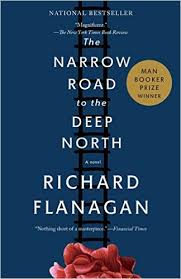 Richard Flanagan
Richard Flanagan
Alfred A Knopf
|
He was not unaware of his critics. Mostly he found himself in agreement with them. His fame seemed to him a failure of perception on the part of others. He had avoided what he regarded as some obvious errors of life, such as politics and golf…He understood that he shared certain features, habits and history with the war hero. But he was not him. He’d just had more success at living than at dying…. from The Narrow Road to the Deep North |
Haunted by one's pasts
A happy man has no past, while an unhappy man has nothing else.
Dorrigo Evans has a past—several of them. An esteemed Australian surgeon and war hero, he has also been an indifferent father and a frequently unfaithful husband. Now in his eighties, his days are filled with “thoughts of his own impending death and the accompanying terror of the old.”
The Narrow Road to the Deep North won the 2014 Man Booker prize, Britain’s highest literary award. The story moves fluidly like the mind in memory mode, or like watching that point where the incoming and outgoing tides of time meet, the past and present pushing and pulling against each other.
He dismisses his war hero status. As a young doctor and officer, he and his men were prisoners of war building the Burma-Siam railway under the Japanese. He is revered by his fellow prisoners; they see him as noble, courageous, self-sacrificing—“everything he knew he was not. As if rather than him leading them by example they were leading him through adulation.”
These are not the Allied troops whistling “Colonel Bogey’s March” as they step briskly before the Japanese in the 1957 film, Bridge on the River Kwai. The prisoners in Flanagan’s novel are starved, broken, beaten, barely human. The brutality of the Japanese guards makes at times for difficult reading. Yet, in spite of Evans’ dismissal that he was any kind of hero, in the camp flashbacks we, too, see him as a man noble, courageous, and self-sacrificing.
The other past that dominates his memories centers around an affair in his youth with his uncle’s young wife. It was the source of his greatest joy, his greatest guilt, his fulfillment and his despair.
Eventually, he marries a woman he respects but does not love—her prominent Melbourne family will benefit his career as a young doctor—and he lives a life of high public esteem and personal hollowness, his unhappiness the source of his many adulterous affairs—“imagining that there must be somewhere someone who could break the spell of torpor, his soul’s strange sleep.”
To an admiring young journalist writing about Evan’s war record, he remarks, “It is not that you know nothing about war, young man…It is that you have learnt one thing. And war is many things.”
Like war, one person’s life is many things; more a kaleidoscope than a linear narrative. At one point Evans reflects that a good book leaves you wanting to reread the book; a great book compels you to reread your own soul. Richard Flanagan has written such a book.
This review first appeared in The Columbia River Reader (May 15-June 14, 2016.) Reprinted with permission.



